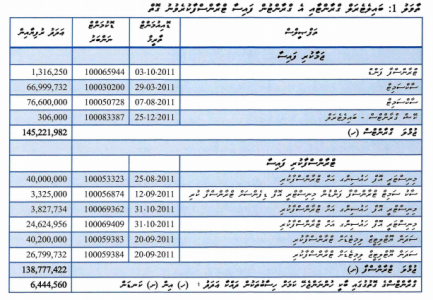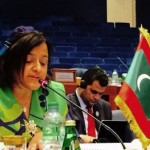The former Maldives Ambassador to the European Union (EU) was paid US$17,000 as a special allowance from September to December 2011 in violation of regulations governing allowances and benefits for employees at diplomatic missions, auditors have revealed.
The audit (Dhivehi) of the Foreign Ministry for 2011 has found that the Maldives embassy in the EU was instructed by Foreign Minister Ahmed Naseem in August 2011 to pay former ambassador Ali Hussain Didi US$3,500 a month as a ‘special representational grant.’
As the allowance was not given to other ambassadors, Auditor General Niyaz Ibrahim recommended recovering the funds from the responsible officials.
The report noted that allowances and benefits for staff at overseas diplomatic missions were specified in regulations enacted by the President’s Office and that the foreign minister did not have the power to authorise such payments.
Auditors also discovered that the former ambassador withdrew the US$3,500 allowance twice in October 2011.
Additionally, €7,566 was deposited to the ambassador’s bank account as a representational grant.
The regulations state that representational grants should be provided as reimbursement once bills of expenses incurred in the performance of diplomatic duties are submitted, the report explained.
However, the report noted that the ambassador did not submit bills for €7,566 worth of expenses.
Former ambassador Didi resigned from the post in July 2012 after 32 years of service.
The audit report also flagged discrepancies between the Foreign Ministry’s annual financial statement and its general ledger at the Finance Ministry, which were not reconciled.
While MVR145 million (US$9 million) was included in the general ledger as bilateral grants, officials at the ministry informed auditors that they were unaware of the inclusion.
Auditors discovered that the Finance Ministry transferred MVR138 million (US$8.9 million) of the grant aid to various state institutions, leaving MVR6.4 million (US$415,045) unaccounted for.
Other cases
The auditor general recommended an investigation by the Anti-Corruption Commission into the hiring of a British national as a senior advisor at the Maldives mission to the EU in March 2010.
Auditors discovered that two employment contracts were signed with the advisor in March 2010 by the foreign minister and state minister respectively, noting that auditors could not confirm which of the two agreements was valid.
While the agreement signed by the foreign minister stipulated that the advisor must be given six months notice before termination of the contract, the agreement signed by the state minister stipulated a four month notice period.
The advisor was paid €25,992 as salary and health insurance for six months when the contract was terminated in June 2011.
Among other cases flagged in the report, auditors found that MVR52,122 (US$3,380) was spent on business class plane tickets for the deputy high commissioner to the UK and his wife to travel to the Maldives in late 2011 in violation of the regulations, which state that only the high commissioner could travel on business class.
A total of MVR64,080 (US$4,155) was meanwhile spent in 2011 to celebrate the ministry’s 78th anniversary in violation of regulations.
The report also noted that the state-owned residence in London – Rosemont Avenue number 10 – had fallen into disrepair as a result of poor maintenance.
While the residence was transferred under the care of the Education Ministry in mid-2011, the report noted that it was not fit for use.
The audit report further revealed that the Maldivian Ambassador to Saudi Arabia as well as the embassy’s counsellor were paid allowances for periods when the pair were away on official trips and vacations.
As 13,957 Saudi riyals and 11,568 Saudi riyals respectively should have been deducted from the allowances in accordance with the regulations, the auditor general recommended recovering the money either from the pair or the officials at the Foreign Ministry responsible for the oversight.
The auditor general also recommended recovering MVR137,676 (US$8,928) spent out of the ministry’s budget to pay mobile phone bills for the foreign minister in 2011 as a phone allowance for ministers had not been approved by parliament.
Moreover, MVR192,416 (US$12,478) was spent to settle mobile phone bills of foreign ministry staff in violation of rules set by the Finance Ministry and Civil Service Commission.
The ministry’s audit report for 2010 had revealed that MVR235,001 (US$15,240) was spent to pay the minister’s phone bills.
 (0)Dislikes
(0)Dislikes (0)
(0)





Very interesting indeed.
Hello Anni. Are you reading this? Are you happy?
I salute the Auditor General for his forensic work. But I find it perplexing that the Auditor General continues to have amnesia about the audit reports that were released by his predecessor. Why has he not taken any action on the audit reports of the Gayoom administration? We have waited for 5 years to see those who robbed us during Gayooms administration brought to justice. And what work is the Auditor General doing to investigate the oil scam that the State Trading Organisation was involved with during Gayoom's administration?
Husni Mubarak of Egypt has just been sentenced for embezzlement of state funds to the tune of 10 million US dollars. With his two sons, he had robbed the Egyptian state for almost 30 years.
They had acquired vast amounts of property and money for themselves, and openly took government money to maintain and run their private properties.
The sentences given to them do not involve the money and properties they had, but just the repair and running costs that they had boldly incurred from state funds.
Recovering all the robbed money from the Mubarak family will be a long, arduous and hopelesss task. The investments abroad may never be either found or recovered. Recovering the money and properties and other investments in Egypt will be a little bit easier. But it will take time and energy of prosecutors.
The term corruption came into vogue in the Maldives only in 2008, but corruption and embezzlement were always there at the core of the Maldivian state and nation. Everybody saw it and knew about it. At the same time everybody was silent.
Islamic vocabulary that Maldivians used and practised until 2008 did not recognise the rotten corruption infested system over which the Maldivian dictators presided. One of those Maldivian dictators is still out and about and truly with us. People who benefited from the system as cronies of the last dictator are very much with us too.
Cronyism is indeed the name of the game.
Those who live in glass houses must not throw stones. Those words are straight from the Bible and they are as true today as they were 2000 years ago.
Ladies and gentlmen. All Maldivians are living in glass houses. Gayoom and his half-brother included. Mohamed Naseem and Ali Hussein Didi included too. Perhaps even our darling Mohamed Nasheed is not blameless.
What we need for our country and for ourselves is not that we throw stones at each other's glass houses.
What we need is for us all to repent and admit our guilt and turn a new leaf in our national book of life. We must publicly promise and swear to do better. And then try our best to follow modern best practice.